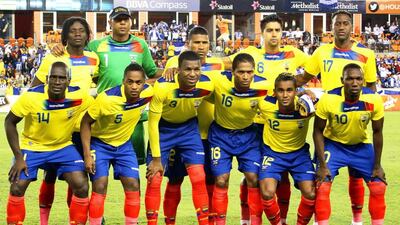A quick look at Ecuador’s World Cup qualifying campaign would lead to the conclusion that their biggest strength was playing home matches at high altitude in Quito.
Generally regarded as the weakest of South America’s six representatives, Ecuador won seven games and drew one at the Atahualpa, their mountain fortress at 2,800 metres above sea level, while on the road they managed only three draws and five defeats.
Coach Reinaldo Rueda, however, is having none of it, and said there is much more to his team than just a piece of geographical fortune.
“Ecuador qualified because we have good players working well, not because of altitude,” he said.
The Andean nation had never played at the World Cup until making their debut in 2002, yet have qualified for three of the past four tournaments.
On all three occasions they have been led by coaches from neighbouring Colombia, firstly Hernan Dario Gomez, then Luis Fernando Suarez and now Rueda.
This time, they overcame tragedy on the way when striker Christian Benitez, who scored in three qualifiers, died of a heart attack in Qatar where he was playing his club football.
Benitez, 27, passed away last July, little more than a month after playing in the qualifier away to Peru, which became his final game.
“Christian will always be in our hearts and our minds, wherever we go,” said captain Antonio Valencia after they clinched their place in Brazil.
Ecuador’s greatest strength is on the wings with Manchester United’s Valencia marauding down the right and the electric Jefferson Montero on the left.
Montero’s speed, trickery and deadly finishing make him an instant crowd pleaser and he can be unplayable on his day. In his best performance of the qualifiers, he single-handedly shredded the Paraguay defence, scoring two goals and brilliantly setting up a third in a 4-1 win.
“He’s the kind of player spectators love to watch because he plays like a kid in the street, daring, throwing opponents off balance,” Rueda said in a recent interview.
“If he improves some small things he’s going to be a great player.”
Cristian Noboa keeps the two wingers supplied with excellent distribution from the heart of the midfield while the hard-tackling Segundo Castillo provides protection for the defence.
Castillo’s role could prove crucial as Ecuador have been shown to have a soft centre.
On their past two World Cup appearances, Ecuador were able to build their team around the impregnable central defensive pairing of Ivan Hurtado and Giovanny Espinoza, who were approaching nearly 200 caps between them.
They are no longer around and Ecuador have failed to replenish the talent pool. The situation has got worse since Frickson Erazo, one of their first choices, moved to Brazilian club Flamengo where he is struggling to get a game.
Their vulnerabilities were exposed in a friendly by a second-string German side last year when Ecuador shipped four goals in the opening 25 minutes, although they hit back with two of their own later on.
They were again caught napping by Australia in March when they conceded three early goals in a friendly in London before recovering superbly to win 4-3. There may be no way back, though, if they have a similar collapse during the World Cup.
Five to watch:
Cristian Noboa, midfielder (Dynamo Moscow); age 29; 42 caps. Fulfilled a boyhood dream by qualifying for the World Cup. A vital cog at the heart of the midfield providing a plentiful supply of passes for the players on the flanks. Has spent most of his career in Russia, firstly with Rubin Kazan and since 2012 with Dynamo.
Antonio Valencia, midfielder (Manchester United); age 28; 67 caps. Ecuador's best known player thanks to his performances for Manchester United since 2009. Born in the Amazonian province of Sucumbios, he stands out on the wing with his pace, tactical obedience and scoring ability. Runs the Antonio Valencia foundation to fight against child labour, violence and drugs. As a child, he helped his mother sell drinks outside a local stadium and searched for empty bottles, which his father sold for recycling. Although he plays on the wing for his club, he began as a central midfielder.
Edison Mendez, midfielder (Independiente Santa Fe); age 35; 108 caps. The squad's most experienced player, he has played in both Ecuador's previous World Cup appearances in 2002 and 2006, and scored their first World Cup goal in the 1-0 win over Croatia in 2002. Was also the first Ecuadorean player to score a goal in the Champions League while playing for PSV Eindhoven in 2007. Briefly quit the national team in 2008 but was quickly persuaded to return. Raised at Deportivo Quito, he has played for clubs in Mexico, the Netherlands and Brazil.
Jefferson Montero, striker (Morelia); age 24; 37 Caps. Raised in a small town on the coast where he began playing football, against older and bigger opponents who he outwitted with his speed and technique. Has since transformed into a hugely skilled winger, almost impossible to play against on his best days and arguably more talented than Valencia. His club career has taken a roundabout route leading him to Mexico via Spanish clubs Villarreal, Levante and Real Betis.
Felipe Caicedo, striker (Al Jazira, UAE); age 25; 47 Caps. Born in Guayaquil, he signed for Swiss club Basel as a 16 year old and then moved to Manchester City where he was billed as a great South American prospect. He has not quite lived up to that early promise and his club career has been unsettled. He is still likely to be the first-choice centre-forward in Brazil and has nevertheless scored some vital goals for his country. Sometimes known as "Felipao" after Brazil coach Luiz Felipe Scolari.
Follow us on Twitter @SprtNationalUAE

